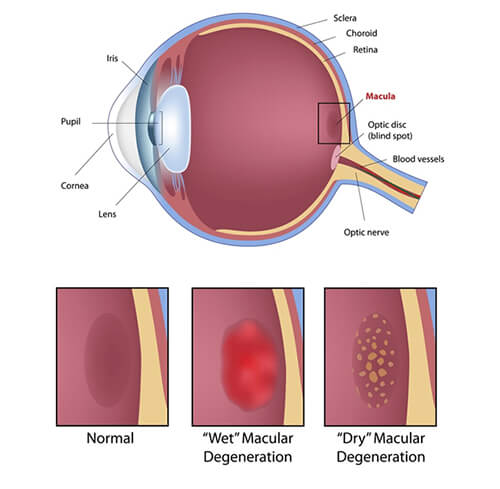When we think of getting older, we often forget that wrinkles and creaky joints aren’t the only sign of aging. Our eyes age too! Aging eyes can mean a decrease in quality of vision. This is generally to be expected. However, there is one common condition that no one ever expects to happen to them: age-related macular degeneration.
What is Age-Related Macular Degeneration?
Age-related macular degeneration (AMD) occurs when the macula (located in the middle of the retina) becomes damaged. The macula is responsible for sharp, central vision. Though symptoms may take years to develop, one of the most common symptoms of AMD is the loss of central vision. Losing your central vision means your daily tasks become extremely difficult. As AMD progresses, reading, driving and even facial recognition all become near impossible. AMD is not a rare occurrence – it’s the number one cause of vision loss among aging Americans.

Types of AMD
There are two types of AMD. The first kind is called “dry” AMD, and is the most common. Dry AMD is considered the early stage of macular degeneration. A diagnosis of dry AMD will usually occur when drusen (yellow fatty spots) begin to disperse around and on the macula. Drusen are debris from declining tissues of the eye. Dry macular degeneration may progress to the more serious form of macular degeneration, “wet” AMD.

Dry AMD
Wet macular degeneration is much more serious, because it leads to the buildup of new blood vessels. These blood vessels then begin to leak fluid and blood, leading to blind spots in your central vision. The leaking blood vessels cause retinal cells to die, leaving permanent damage in their wake.
Wet AMD
AMD Treatments
As of today, there is no proven treatment for dry AMD. Depending on the severity of your dry AMD, your doctor may recommend certain vitamin supplements (AREDS-2) for dry AMD that may slow progression. High doses of certain vitamins and antioxidents have been shown to slow down the progression of early dry AMD to advanced AMD by at least 25%.
For those who develop wet AMD, there are treatment options. Treatments for wet AMD are aimed at stopping progression – any vision lost cannot usually be regained. Treatments for wet AMD include:
- Injections of anti-VEGF medications into the eye (Avastin, Lucentis, Eylea)
- Photodynamic therapy (Visudyne drug treatment)
- Laser Treatment (Laser photocoagulation)
Anti-VEGF injections are the main treatment for wet AMD. Photodynamic therapy and laser are rarely used these days.
If you have been diagnosed with age-related macular degeneration, it’s important to stay up to date with all doctor appointments. Attleboro Ophthalmological Associates care about you and your vision every step of the way. Give us a call to schedule a consultation with one of our doctors!

